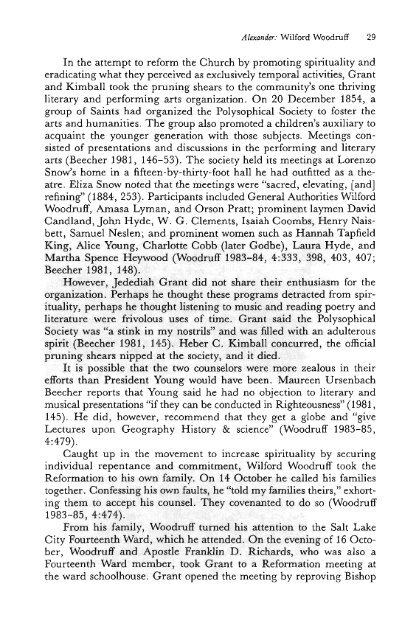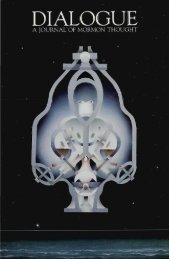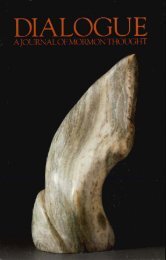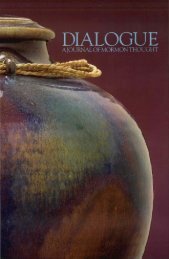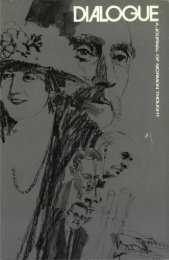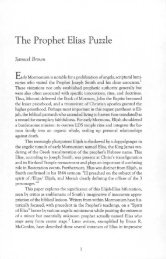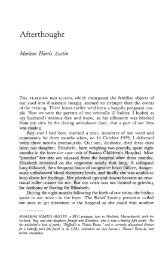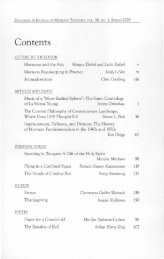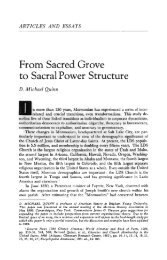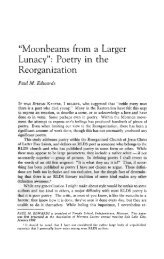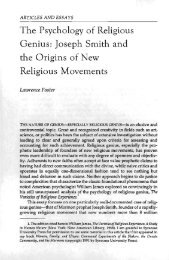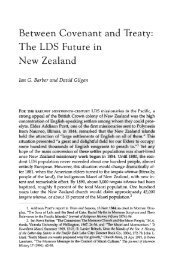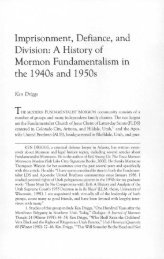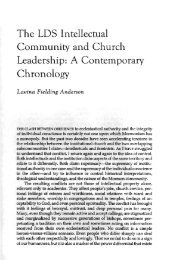Dialogue, Volume 25, Number 2 - Dialogue – A Journal of Mormon ...
Dialogue, Volume 25, Number 2 - Dialogue – A Journal of Mormon ...
Dialogue, Volume 25, Number 2 - Dialogue – A Journal of Mormon ...
Create successful ePaper yourself
Turn your PDF publications into a flip-book with our unique Google optimized e-Paper software.
Alexander: Wilford Woodruff 29<br />
In the attempt to reform the Church by promoting spirituality and<br />
eradicating what they perceived as exclusively temporal activities, Grant<br />
and Kimball took the pruning shears to the community's one thriving<br />
literary and performing arts organization. On 20 December 1854, a<br />
group <strong>of</strong> Saints had organized the Polysophical Society to foster the<br />
arts and humanities. The group also promoted a children's auxiliary to<br />
acquaint the younger generation with those subjects. Meetings consisted<br />
<strong>of</strong> presentations and discussions in the performing and literary<br />
arts (Beecher 1981, 146-53). The society held its meetings at Lorenzo<br />
Snow's home in a fifteen-by-thirty-foot hall he had outfitted as a theatre.<br />
Eliza Snow noted that the meetings were "sacred, elevating, [and]<br />
refining" (1884, <strong>25</strong>3). Participants included General Authorities Wilford<br />
Woodruff, Amasa Lyman, and Orson Pratt; prominent laymen David<br />
Candland, John Hyde, W. G. Clements, Isaiah Coombs, Henry Naisbett,<br />
Samuel Neslen; and prominent women such as Hannah Tapfield<br />
King, Alice Young, Charlotte Cobb (later Godbe), Laura Hyde, and<br />
Martha Spence Heywood (Woodruff 1983-84, 4:333, 398, 403, 407;<br />
Beecher 1981, 148).<br />
However, Jedediah Grant did not share their enthusiasm for the<br />
organization. Perhaps he thought these programs detracted from spirituality,<br />
perhaps he thought listening to music and reading poetry and<br />
literature were frivolous uses <strong>of</strong> time. Grant said the Polysophical<br />
Society was "a stink in my nostrils" and was filled with an adulterous<br />
spirit (Beecher 1981, 145). Heber C. Kimball concurred, the <strong>of</strong>ficial<br />
pruning shears nipped at the society, and it died.<br />
It is possible that the two counselors were more zealous in their<br />
efforts than President Young would have been. Maureen Ursenbach<br />
Beecher reports that Young said he had no objection to literary and<br />
musical presentations "if they can be conducted in Righteousness" (1981,<br />
145). He did, however, recommend that they get a globe and "give<br />
Lectures upon Geography History & science" (Woodruff 1983-85,<br />
4:479).<br />
Caught up in the movement to increase spirituality by securing<br />
individual repentance and commitment, Wilford Woodruff took the<br />
Reformation to his own family. On 14 October he called his families<br />
together. Confessing his own faults, he "told my families theirs," exhorting<br />
them to accept his counsel. They covenanted to do so (Woodruff<br />
1983-85, 4:474).<br />
From his family, Woodruff turned his attention to the Salt Lake<br />
City Fourteenth Ward, which he attended. On the evening <strong>of</strong> 16 October,<br />
Woodruff and Apostle Franklin D. Richards, who was also a<br />
Fourteenth Ward member, took Grant to a Reformation meeting at<br />
the ward schoolhouse. Grant opened the meeting by reproving Bishop


